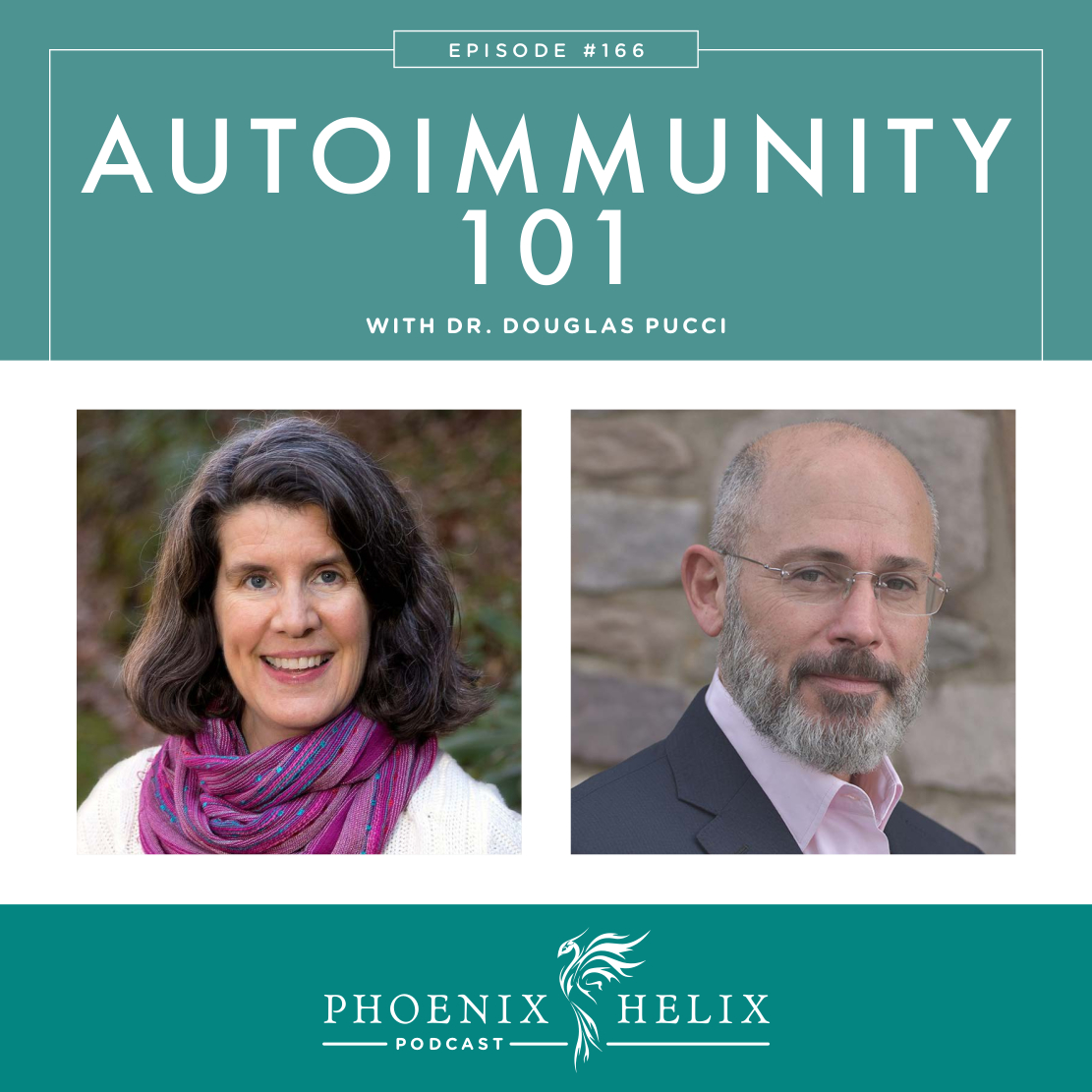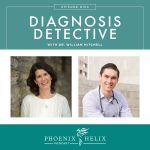Understanding What’s Happening Within Our Bodies
Most people listening to this podcast have autoimmune disease, but it can be confusing to understand what exactly is happening within our bodies. That changes today! In this episode, we take a deep dive into the immune system. How does a healthy immune system work? What changes with autoimmune disease? How do diet and lifestyle choices calm down (or ramp up) the autoimmune response? My guest is Dr. Douglas Pucci, a functional medicine doctor with over 30 years clinical experience. He has a gift for describing medical information in a way that’s easy to understand.
Listen to the Show
- Subscribe to my podcast through your favorite podcast app: iTunes, Stitcher, Google, TuneIn, Spotify, Amazon, etc.
- You can also listen to the episode right here through the player below, and if you subscribe to my newsletter you’ll get notified of future episodes.
Podcast: Play in new window | Download
Show Notes
- Intro (0:00)
- Thank You To Our Podcast Sponsor – Paloma Health (1:44)
- January is Thyroid Awareness Month, and as many of you know hypothyroidism has become an epidemic, with Hashimoto’s Thyroiditis one of the most common autoimmune diseases.
- Paloma Health is a telemedicine practice that offers complete care for hypothyroidism, empowering patients to reclaim their health.
- They offer easy, at-home, thyroid tests which measure TSH, free T3, free T4, and TPO antibodies (with the option to add-on reverse T3 and vitamin D).
- However, they’re not just a testing company. Their goal is to offer complete medical care, and that means consultations with physicians who are thyroid specialists. Doctors are currently available in 13 states (and growing!) These doctors can prescribe thyroid medication, but they also understand the role, diet, lifestyle, and supplements can play in thyroid health.
- Nutritional counseling is available in all 50 states, and they even have a free mobile app to guide you through the AIP diet and lifestyle (it’s also a symptom tracker).
- For more information, visit their website: PalomaHealth.com, and save $30 off your first thyroid test with the code PHOENIX.
- Meet Dr. Douglas Pucci (4:19)
- He’s a functional medicine doctor with over 30 years clinical experience.
- He began his career as a chiropractor with the goal of treating patients holistically, but insurance narrowed his focus to back pain which was disheartening. He noticed that some patients didn’t hold their adjustments while others did, and he wanted to understand why. First he trained in functional neurology, and then he received advanced training in full-body functional medicine. That’s the focus of his practice today.
- Big Picture Look at the Immune System (8:21)
- It’s a complex system with a unified goal: to protect us against things that are potentially harmful. It’s our body’s defense.
- The immune system is spread throughout the body – there’s no place where it isn’t present. It interacts with every organ, every system, every cell.
- There are organs within the immune system (bone marrow, thymus, spleen, lymph nodes) that create immune cells and differentiate them for specific roles. Those cells then get sent wherever they’re needed in the body.
- The skin is a protective barrier that’s part of our immune system. There are also mucosal barriers in every cavity within our body, and those barriers house immune cells. Their role is to survey what’s coming into our bodies from the outside (the air we breathe, the food we eat, etc.) These barriers are found in our mouth, sinuses, bronchial tubes, digestive system, etc.
- A good analogy for the immune system is a football team. There’s offense, defense, coaches, and unique positions on the team. Everyone has a different role, but they’re all working together on a common goal.
- Resources:
- Two Branches: Innate & Adaptive (12:43)
- Innate: This is the immune system we’re born with, and it’s the branch that acts immediately when our body is under threat. It works around-the-clock, and if it encounters something it’s never seen before, it calls in the adaptive immune system to help.
- Adaptive: Also called our acquired immune system, this branch of the immune system is more specific, and it learns over our lifetime. It identifies the threat, neutralizes it if possible, and remembers it so the body can respond more quickly next time. When we’re sick and feel too tired to get out of bed, this is intentional. Our adaptive immune system needs a lot of energy to do its job.
- Resource: Innate vs. adaptive immune system.
- Antigens vs. Antibodies (14:43)
- Antigens are anything viewed by the immune systems as foreign (viruses, bacteria, germs, parasites, toxins, allergens, etc.) With the autoimmune response, a part of the body is seen as foreign.
- Antibodies are produced by the adaptive immune system in response to those antigens. They act as a bullseye, drawing other immune cells to the antigen to remove it from the body. There are different types of antibodies generated by different parts of the immune system. (IGA antibodies are the first responders in the mucosal lining, IGG antibodies circulate in the bloodstream holding memory for a specific antigen, and IGE antibodies create an anaphylactic allergic response).
- The Autoimmune Response (17:51)
- Dr. Pucci doesn’t see the immune system as confused during an autoimmune response. Rather, he believes the immune system is doing exactly what it’s supposed to do. There are over 80,000 chemicals that have been released into the environment in the past 150 years, and those chemicals make their way into our bodies and have the potential to get absorbed into our tissues. This means our tissues no longer look the same to our immune system, and that’s how they get identified as foreign.
- Th1/Th2: These are two branches of the adaptive immune system. Th2 is an inflammatory response that creates antibodies to foreign antigens. (When the immune system identifies part of the body as foreign, that’s called an autoantigen and the immune system creates autoantibodies). The Th1 response releases killer cells designed to remove those antigens. (In autoimmune disease, Th1 then attacks self-tissue, i.e the thyroid in Hashimoto’s or the joints in rheumatoid arthritis.)
- The reason there is no cure for autoimmune disease is that the adaptive immune system remembers the autoantigen and its corresponding autoantibody. That can’t be unlearned. However, the immune system can be brought into balance again, and remission is possible.
- Spectrum of Autoimmunity:
- Silent Autoimmunity: Antibodies are present, but there are no symptoms. (Note: you can be in remission and still have antibodies; this is OK and not a cause for concern.)
- Active Autoimmunity: Something triggers Th1 to start responding to the antibodies, attacking self-tissue.
- Destructive Autoimmunity: The Th1 response is now aggressively destroying self-tissue.
- Immune System Regulation & Feedback Loops (30:00)
- In addition to the Th1 & Th2 cells involved in autoimmune expression, new research discovered a cell called Th17 which can worsen autoimmune expression, and T regulatory cells which can restore balance and remission.
- Often with autoimmunity, the immune system gets caught in a feedback loop. The Th2 system gets overstimulated, driving up inflammation. In addition to creating antibodies, Th2 stimulates Th17 cells. Th17 then stimulates the Th1 system, increasing the attack on self-tissue. Th1 then releases chemicals that upregulate both Th17 and Th2, keeping the cycle going.
- Thankfully, the immune system also has T regulatory cells that can disrupt this feedback loop, calm down the immune system, and restore balance.
- Resource: T cells research.
- Supplements (33:39)
- Research shows that Vitamin D increases the number of T regulatory cells we have. These are the cells that balance our immune system. Dr. Pucci believes it’s an essential supplement for people with autoimmune disease. Since it’s a fat-soluble vitamin, it’s important to monitor your levels with lab testing.
- Regarding supplements overall, Dr. Pucci believes that less is better. A grocery bag full of supplements isn’t going to cure autoimmunity, and there is no magic supplement.
- Instead, diet and lifestyle factors play a much bigger role in autoimmune disease. We need to macromanage before we micromanage. This means paying attention to diet, sleep, stress management, social connection, healthy movement, and gut health.
- The gut microbiome has a huge impact on health overall and autoimmune health specifically. However, diet has a much bigger impact than any supplement. When we eat healthy foods, we provide food for beneficial bacteria, and when we eat sugar and processed foods, we provide food for pathogenic bacteria. A supplement cannot override our dietary choices.
- Resources:
- Food Intolerance & the Immune System (35:47)
- When our immune system reacts to a food, it’s caused by two things: leaky gut combined with undigested proteins. Our digestion works to break proteins down into amino acids which are beneficial to the body. However, sometimes there’s a problem with digestion, and those proteins aren’t broken down completely. If leaky gut is also present, those protein peptides slip through our gut lining into our bloodstream. Our immune system reacts, because protein peptides aren’t supposed to be there. It tags them with antibodies which hold a memory, so each time you eat that food going forward, your immune system reacts again.
- Simultaneously, your immune system is now upregulated. It’s not just responding to food antibodies, but also to the autoantibodies against self-tissue. That’s how food intolerance increases autoimmune activity.
- The good news is that as we work to restore gut health, including healing leaky gut, food reactions decrease and we tolerate more foods.
- Resources:
- Dr. Pucci’s Diet Recommendation: Keep It Simple & Real (40:41)
- There is no food neutral. 70% of our immune system is located in our gut, so the foods we eat have a direct impact. They’re either nutritious and helpful or inflammatory and unhelpful.
- Avoid processed foods, foods high in sugar and salt, and foods to which you are intolerant. Be cautious of packaged foods, and read labels closely if you choose them.
- The majority of your diet should be real, living foods (ones that don’t come in a package). Eat plenty of fresh vegetables, fruits, healthy fats, and lean proteins.
- Sleep & the Immune System (43:04)
- Research is clear that the immune system depends on recuperative sleep. That is when our body heals, recovers, and detoxifies.
- The number one cause of insomnia is blood sugar dysregulation. Our brain needs blood sugar for fuel. If blood sugar levels plummet overnight, that activates a stress response that wakes us up and puts our immune system on guard. If you wake up in the middle of the night and can’t get back to sleep, this is often the cause. Learning to regulate your blood sugar throughout the day can help you sleep better at night.
- Dr. Pucci’s second tip is to put away your electrical devices a few hours before bed. The blue light and the EMFs can both interfere with circadian rhythms (our body’s sleep/wake cycle).
- Dr. Pucci’s last tip is to wake up at the same time every day, even on your days off. The body likes routine, and this also helps reset your circadian rhythms. Over time, you’ll start to get tired and go to bed earlier.
- Resources:
- Stress & the Immune System (46:17)
- Not all stress is bad, and stress has a role. It’s part of our survival response. The problem is when stress becomes chronic.
- If you watch animals and they’re chased or get in a fight, the animal is in a fight/flight response, but when the threat passes they quickly return to a calm state of being. Human beings don’t do that. We hold on to stress, and we also live in a world where we experience stress constantly. Our nervous system isn’t designed for this, and it goes into a defense posture. Our immune system then shifts into an inflammatory state. And digestion is inhibited as well.
- Taking time for stress breaks throughout the day can be very helpful. Just a few deep breaths can shift your body out of a stress response and into a relaxed, parasympathetic state that helps regulate the immune system and calm the inflammatory response.
- Tuning into the present moment also activates the relaxation response. Our brains aren’t designed for multi-tasking, so every time we do more than one thing at a time, we’re putting stress on our body.
- Resources:
- Article – 5 Quick Stress Relievers.
- Podcast – Ep. 198: Healing Mindset.
- Book – Healing Mindset – a guide to the mind-body connection for people with autoimmune disease.
- Final Words of Wisdom (51:02)
- If you experience an autoimmune flare, don’t see that as your immune system failing you. Instead, see it as a signal from your body that something is triggering your immune system. Follow the tips shared in this podcast to help nurture your immune system back into balance.
- Resources:
- Outro (51:50)
- Dr. Douglas Pucci is accepting new clients, and you can reach him through his website: GetWell-Now.com. He also has a free video series: How To Address Chronic Health Concerns Naturally.
- Eileen (your podcast host) is the author of multiple books, written to help people thrive with autoimmune disease. Learn more on the Books Page.
- If you like this podcast, follow or subscribe through your favorite podcast app. You can also subscribe to Eileen’s biweekly newsletter.
- Check out the entire archive of podcast episodes.
You May Also Be Interested In
Spreading the Word
If you like the podcast, please leave a positive review in iTunes. It would mean the world to me, and also helps others find the podcast. Here are some quick instructions using your iPhone:
- If you are already subscribed to my podcast: (1) Click the purple podcast icon. (2) At the bottom of the screen, click Library. (3) At the top of the screen, click Shows. (4) Click the Phoenix Helix podcast image. (5) Scroll down the page, and you’ll see Ratings and Reviews. Scroll down a little bit more and click on Write a Review. This will bring up the review screen. Tap 5 stars (if you love the podcast), and then click in the title box, and it will bring up the keyboard. Enter a title and short review. (6) Click Send in the upper right corner. (7) Thank you! Positive reviews give the podcast a higher search ranking in iTunes, helping people find it and letting them know it’s a quality podcast and worth their time to listen.
- If you haven’t subscribed to my podcast: (1) Click the purple podcast icon. (2) In the lower right corner, click the magnifying class. (3) Type Phoenix Helix in the search box. (4) Click the podcast cover in the Show list. (5) If you’d like to subscribe, click the + sign at the top of the screen. (6) To write a review, scroll down the page, and you’ll see Ratings and Reviews. Scroll down a little bit more and click on Write a Review. This will bring up the review screen. Tap 5 stars (if you love the podcast), and then click in the title box, and it will bring up the keyboard. Enter a title and short review. (7) Click Send in the upper right corner. (8) Thank you! Positive reviews give the podcast a higher search ranking in iTunes, helping people find it and letting them know it’s a quality podcast and worth their time to listen.








